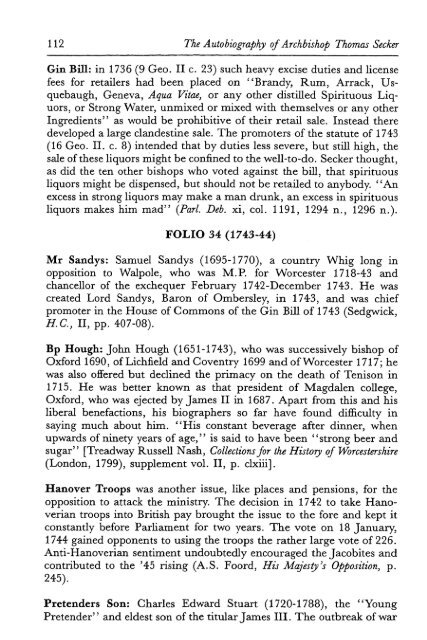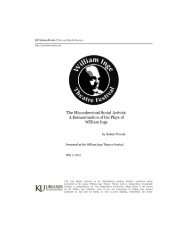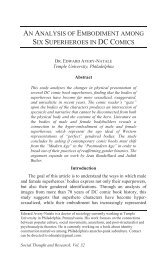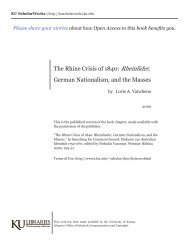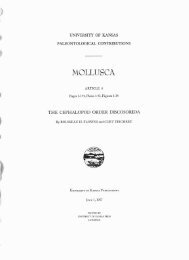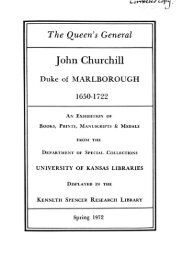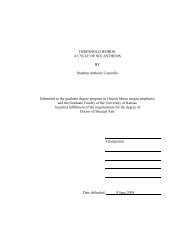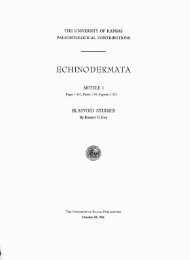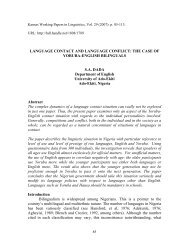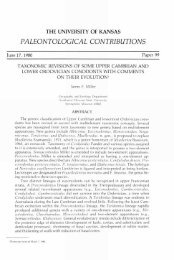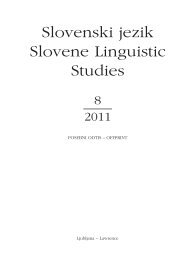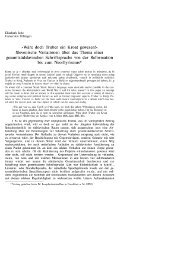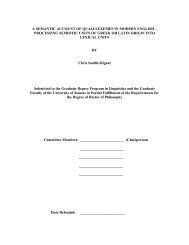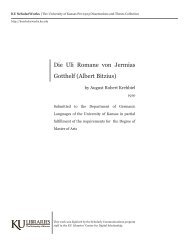Archbishop of Canterbury - KU ScholarWorks - The University of ...
Archbishop of Canterbury - KU ScholarWorks - The University of ...
Archbishop of Canterbury - KU ScholarWorks - The University of ...
Create successful ePaper yourself
Turn your PDF publications into a flip-book with our unique Google optimized e-Paper software.
112 <strong>The</strong> Autobiography <strong>of</strong> <strong>Archbishop</strong> Thomas Seeker<br />
Gin Bill: in 1736 (9 Geo. II c. 23) such heavy excise duties and license<br />
fees for retailers had been placed on "Brandy, Rum, Arrack, Usquebaugh,<br />
Geneva, Aqua Vitae, or any other distilled Spirituous Liquors,<br />
or Strong Water, unmixed or mixed with themselves or any other<br />
Ingredients" as would be prohibitive <strong>of</strong> their retail sale. Instead there<br />
developed a large clandestine sale. <strong>The</strong> promoters <strong>of</strong> the statute <strong>of</strong> 1743<br />
(16 Geo. II. c. 8) intended that by duties less severe, but still high, the<br />
sale <strong>of</strong> these liquors might be confined to the well-to-do. Seeker thought,<br />
as did the ten other bishops who voted against the bill, that spirituous<br />
liquors might be dispensed, but should not be retailed to anybody. "An<br />
excess in strong liquors may make a man drunk, an excess in spirituous<br />
liquors makes him mad" (Pari Deb. xi, col. 1191, 1294 n., 1296 n.).<br />
FOLIO 34 (1743-44)<br />
Mr Sandys: Samuel Sandys (1695-1770), a country Whig long in<br />
opposition to Walpole, who was M.R for Worcester 1718-43 and<br />
chancellor <strong>of</strong> the exchequer February 1742-December 1743. He was<br />
created Lord Sandys, Baron <strong>of</strong> Ombersley, in 1743, and was chief<br />
promoter in the House <strong>of</strong> Commons <strong>of</strong> the Gin Bill <strong>of</strong> 1743 (Sedgwick,<br />
H.C, II, pp. 407-08).<br />
Bp Hough: John Hough (1651-1743), who was successively bishop <strong>of</strong><br />
Oxford 1690, <strong>of</strong> Lichfield and Coventry 1699 and <strong>of</strong> Worcester 1717; he<br />
was also <strong>of</strong>fered but declined the primacy on the death <strong>of</strong> Tenison in<br />
1715. He was better known as that president <strong>of</strong> Magdalen college,<br />
Oxford, who was ejected by James II in 1687. Apart from this and his<br />
liberal benefactions, his biographers so far have found difficulty in<br />
saying much about him. "His constant beverage after dinner, when<br />
upwards <strong>of</strong> ninety years <strong>of</strong> age," is said to have been "strong beer and<br />
sugar" [Treadway Russell Nash, Collections for the History <strong>of</strong> Worcestershire<br />
(London, 1799), supplement vol. II, p. clxiii].<br />
Hanover Troops was another issue, like places and pensions, for the<br />
opposition to attack the ministry. <strong>The</strong> decision in 1742 to take Hanoverian<br />
troops into British pay brought the issue to the fore and kept it<br />
constantly before Parliament for two years. <strong>The</strong> vote on 18 January,<br />
1744 gained opponents to using the troops the rather large vote <strong>of</strong> 226.<br />
Anti-Hanoverian sentiment undoubtedly encouraged the Jacobites and<br />
contributed to the '45 rising (A.S. Foord, His Majesty's Opposition, p.<br />
245).<br />
Pretenders Son: Charles Edward Stuart (1720-1788), the "Young<br />
Pretender" and eldest son <strong>of</strong> the titular James III. <strong>The</strong> outbreak <strong>of</strong> war


